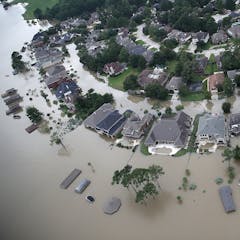
Articles on Probability
Displaying 1 - 20 of 53 articles

We crave certainty in our weather forecasts. But that’s only possible for big weather events such as cyclones and major storms. Everything else is probability.

The universe appears to be fine-tuned for life to evolve.

The best science is not always the best engineering when it comes to building codes. It’s also a problem across the US, as an engineer who works on disaster resilience explains.

What are the odds of the end of humanity? There’s no real way to know.

It’s not entirely accurate to say that you’re more likely to die in a car accident than in a plane crash. Chances are, you’re not the average person.

An epigenetic model of cancer that incorporates the concept of stochasticity could also explain why cancer risk increases with age and how biological development can be reversible.

The oldest person in the world, Kane Tanaka of Japan, died in April 2022 at 119 years. The record of Jeanne Calment of France, who died at 122, has stood for almost 25 years. Will it be beaten?

A lottery jackpot being won by 433 people in the Phillipines has raised accusations of foul play. Then again – such outcomes usually do.

Buying and selling stocks – with real or play money – is a way to harness the wisdom of the crowd about questions like who is going to win a competition.

People want a simple answer. Is this action safe? But despite Anthony Fauci bouncing responsibility for COVID-19 risk assessment to individuals, your risk can’t be boiled down to one probability.

People tend to dislike uncertainty and risk – two things that are hard to avoid completely during a pandemic. That’s part of why it can feel especially draining to make even small decisions these days.

Rapid Antigen Tests are being rolled out by the millions for Australians to check their COVID status. But a result should be interpreted in context.

Why haven’t people gotten upset about how our social distancing signs are fostering innumeracy?

Flood plain statistics can be confusing. There are better ways to think about the risk of severe weather than 100-year storm or flood.

We used probability to find out what collecting all 678 stickers might cost you.

With the Australian Open about to start this year’s grand slam series, a crunch of the data from past performances gives a hint at who is the current best male player, possibly.

Philosopher Nick Bostrom’s theory suggests there’s a one-in-three probability we live in a simulation.

The danger of treating COVID-19 as an astronomically rare and improbable event is that we will treat it as such and fail to prepare for the next pandemic. And there will be another pandemic.

Tim Hortons changed Roll up the Rim to include a digital element. A statistician correctly predicted that playing on the last day of the contest would dramatically increase the odds of winning.

Kea were able to correctly guess the most probable scenarios, by evaluating various physical and social cues. Previously, only great apes and humans were known to be able to understand probability.
